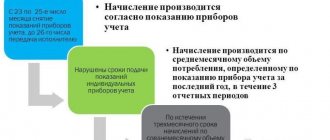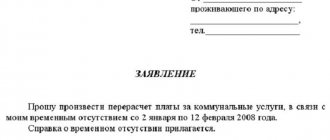Families or single citizens who experience financial difficulties in paying for housing and utilities can receive a targeted subsidy from the state. This right to a subsidy is established by Article 159 of the Housing Code of the Russian Federation. To qualify for benefits, a citizen must spend more than the established cost norm for housing and communal services in the region. According to the Ministry of Construction, in Russia already a quarter of the population provides such support.
In this material we will tell you who can apply for a subsidy, what conditions are important to meet, and where to apply.
Bankiros.ru
General Tips
- Installing lever faucets can save water because it takes longer and uses more water to set the temperature with a two-valve system.
- Due to faucet leaks, several hundred liters of water can be lost per month, so it is worth taking care of the condition of the plumbing and calling a specialist if any faults are detected.
- Owners of cast iron batteries can call a plumber for free to clean them in the summer.
- The batteries can be equipped with control valves to control the amount of heat energy supplied, thereby saving it whenever possible.
- Due to poor insulation of pipes in boiler rooms and basements of houses, a lot of heat energy is lost. Having secured the consent of all residents of the house, you can contact the management company and the contractor to install a common house meter, which can save up to 30% of heat energy.
- When purchasing new household appliances, you should choose economical class “A” models, as they consume less electricity.
- Maintaining your refrigerator is also a way to save money, since a freezer with ice frozen on it uses more electricity.
- To save up to 30% of electricity in the apartment, you can install automated motion control sensors that control electric lighting.
- When going on vacation, to avoid wasting resources, you should unplug all electrical appliances. For more efficient savings, you can turn off water and electricity.
- When paying for housing and communal services, you should carefully check receipts to avoid unnecessary expenses.
If an error is discovered, you need to contact the appropriate organization that issues the receipt, and, if necessary, the state housing inspectorate, which checks the correctness of the calculation of the amount of payment for housing and communal services.
Is it possible to save money on housing and communal services?
The apartment user must pay the bills regularly. Therefore, we will immediately warn you that the article will discuss legitimate ways to save money.
You can save on utility bills. In some cases, the state provides subsidies (compensations) to low-income families who are unable to pay utility bills.
The subsidy is assigned based on the criterion of need, so not all citizens can qualify for it. Persons who do not receive compensation from the state can reduce the amount of payment using our tips.
Who is eligible for benefits?
Many consumers can count on government support in paying for housing and communal services, provided for by federal or regional regulations.
Benefits are provided to specific categories of citizens, regardless of income level, size of the apartment and whether it belongs to a specific housing stock. With the help of benefits, consumers can pay up to 50% of housing and communal services, but only for one residential property.
The following may apply for state assistance in the form of benefits:
- Large families raising four or more children.
- Disabled people, as well as the families where they live.
- Families of employees.
- Heroes of the Russian Federation and the USSR with differences in the field of labor.
- Veterans, participants, relatives of those killed in the Second World War.
- Donors marked with a special sign.
To apply for benefits, you can contact the department of social protection of the population at your place of residence, providing the following documents:
- Applicant's passport.
- A document proving the applicant’s relationship to a certain preferential category.
- A certificate proving the absence of housing and utility debts for the past months.
- Certificate of family composition living at a specific address.
- Help showing the amount of living space.
- Document of ownership.
Subsidies
Unlike benefits, subsidies can be provided to those citizens whose costs for housing and communal services exceed a certain percentage of the income of all family members (from 10% to 22% depending on the region). The level of subsidy payments is determined by law and is not always limited to the subsistence level. Accruals are made in advance for the next six months.
Only citizens of Russia, Belarus or Kyrgyzstan who do not have debts for housing and communal services can apply for government assistance in the form of subsidies. It can be:
- Owners of housing (apartment, residential building or part thereof).
- Users whose housing belongs to municipal or state housing stock.
- Participants in a housing cooperative or housing construction association.
- Citizens renting a separate private living space under a contract.
To apply for government support, you can contact the city center for housing subsidies at your place of residence, providing the following documents:
- Passports of all family members of the applicant.
- A document confirming the right to own housing.
- Certificate confirming family composition.
- A certificate confirming the income level of each family member.
- A certificate proving the absence of housing and utility debts for the past months.
- Bank account details.
Experts give advice on how to save on rent
1. Refuse the imposed services. These include insurance, concierge services, security, video surveillance, landscaping and landscaping of the local area. But if paying for home insurance is a strictly individual decision, then the decision to pay for the concierge, security, etc. is made by the owners at a general meeting. If the meeting decided to pay for it, then even those who voted “against” are obliged to pay. In this case, you can only check whether the meeting was held correctly and, if violations are discovered, appeal this decision.
If necessary, file a claim with the court to exclude the imposed service from the receipt for payment of housing and communal services. Management companies often include additional services in the general receipt; their failure to pay will result in a total rent arrears. And this, in turn, deprives the owner of the opportunity to receive subsidies and compensation for utility bills, if they are due.
2. Demand a recalculation for poor quality services. First, you need to file a formal complaint with the management organization about the provision of services of inadequate quality or the fact that they are not provided at all. These facts need to be recorded - for example, by calling a technician to show a non-working elevator or lukewarm “hot” water. If the management company officially refuses to recalculate, go to court with a demand to force it to be carried out.
3. Check your calculations. The consumer has the right, in case of doubt about the calculations, to submit an application to the management company or homeowners association with a request to provide information on methods for calculating payments and the applicable tariffs for a particular service. This right can and should be used.
4. Don't pay for an empty apartment. If residents are away for a long time, it is necessary, if possible, to turn off all electrical appliances or switch them to energy-saving mode. If the homeowner pays according to standards, and not according to meters, since their installation is technically impossible, he may be recalculated payments for water, sewerage, electricity, gas and garbage collection during the period of absence. To do this, you need to write an application to the management organization with a request to recalculate. It must be accompanied by a document confirming the absence - a travel voucher, a certificate from work about a business trip, a certificate from the chairman of a gardening association, a certificate from a medical institution about inpatient treatment, etc.
5. Reduce entrance fees. Installing energy-saving lamps in the entrance with motion sensors, communal meters for water, heat, electricity, eliminating heat loss by insulating entrance doors and windows will allow all residents to save money. The responsibility for eliminating energy and heat losses lies with the management organization.
6. Earn money from common property. Thrifty owners make the most of this opportunity: they rent out technical floors, roofs, and halls - for example, for installing equipment from Internet providers, billboards, and water pumps. The funds received can be used for general house needs, landscaping, and major repairs. Owners can thus reduce their payments and even get rid of them altogether using the proceeds.
7. Apply for government support. In a difficult financial situation, you can apply for a subsidy or compensation for utility bills. The subsidy can be received by those whose utility bills exceed 22% of their income (in some regions the percentage may be lower). To receive a subsidy, you need to contact the MFC. Also, some categories of beneficiaries (parents of large families, disabled people, parents of disabled children, heroes of Russia, etc.) have the right to receive compensation for housing and communal services, up to 50% of payments. However, receiving compensation does not deprive you of your right to a subsidy.
8. Reduce your consumption. Finally, we cannot help but remind you of the opportunity to reduce the consumption of resources that are paid for by apartment meters - water, electricity, and sometimes gas and heat. Energy-saving lamps, Class A household appliances, water diffusers in the shower, water pressure regulators in faucets, toilet cisterns with the possibility of a “small” flush, etc. help you save money. Fix leaks in faucets and pipes. Turn off electrical appliances when leaving home - this will reduce passive consumption.
Counters
Individual meters are devices that measure and take into account the amount of resources supplied to the apartment (water, electricity, gas). By installing them, the consumer will be able to pay for housing and communal services at reduced rates, without overpaying for what he does not use.
To install a water meter you should:
- Contact the management company at your place of residence to obtain the necessary documents (technical installation conditions, water supply diagrams).
- Purchase meters depending on how many risers (stop taps) are in the apartment.
- Install meters by contacting specialists.
- Draw up a tripartite act for putting meters into operation (the document is signed by the installer, the owner of the living space and a representative of the management company).
- Conclude an agreement with the management company to pay for water according to meters.
To install an electricity meter you should:
- Contact any organization that installs electricity meters.
- Purchase and install a multi-tariff meter (unlike a regular one, it takes into account the time of day).
- Contact the energy supply or energy sales organization that services the house to seal the meter (you can determine the required organization from the management company).
- Conclude an agreement with the management company to pay for electricity by meters.
To install a gas meter you should:
- Submit an application to an organization that has a license to install gas meters (in Moscow - Mosgaz).
- Pay for the installation of the meter by a specialist (during installation, it may be necessary to rearrange gas appliances or change the intra-apartment gas distribution).
- Contact a representative of the gas supplier to seal the meter and take readings.
Install counters
Absolutely all citizens can install metering devices. Meters allow you to accurately determine the amount of utility bills. That is, by installing meters, you will pay only for the service actually provided (and used).
Counters can be installed:
For cold and hot water.
On gas.
For electricity.
For heating.
If water, gas and electricity meters are in most cases individual metering devices, then a heating meter is installed on a house or entrance.
Those who believe that with the installation of meters there is no need to pay for housing and communal services are, to some extent, right. Metering devices allow you to control the amount of utility bills . If no one lives in the apartment, you will not have to pay for housing and communal services. This rule does not apply to heating.
Extract
If payment for housing and communal services is carried out not according to metering devices (meters), but according to approved standards (based on the number of people registered in the house), you should pay attention to who is registered in the apartment. It often happens that people are registered (usually relatives) who have not actually lived in the living space for a long time, but the fee for them is calculated and increases every year. It is possible to discharge “phantom tenants” without their personal consent only through the court.
Recalculation
If a consumer is absent from home for a long time (more than five days), he has the right to recalculate the cost of payment for certain residential complex services by contacting the appropriate center or management company at his place of residence. Such a request can only be made if the housing is technically impossible to equip with meters. To carry out the recalculation you will need:
- Application for recalculation.
- An inspection report confirming the impossibility of installing individual meters.
- A document confirming the fact and duration of absence of the applicant or at least one of the family members registered in a particular housing.
Who can apply for subsidies to pay for housing and communal services?
A citizen of Russia belonging to any of the social categories below can apply for payments:
- home owners;
- tenant of housing, including under a social tenancy agreement;
- members of housing cooperatives;
- foreign citizens who have permanent registration in the Russian Federation and belong to one of the categories above. If such an agreement is concluded between Russia and their state. For example, Citizens of the Belarusian and Kyrgyz Republics have the right to such a subsidy, because our countries have similar agreements.
Deposit “Savings Account” Moscow Credit Bank, Person. No. 1978
up to 7.75%
per annum
from 1
Make a contribution
In this case, an individual family or single citizen is entitled to only one such subsidy.
Radio point and antenna
Many citizens still spend money on housing and communal services that they have not used for a long time.
The radio station, which is equipped in every house (except for new buildings), is designed to notify residents of emergency situations. Today, SMS alerts are in effect, but they are still found on many utility receipts. Consumers have the right to turn it off by contacting the management company, the district office of the engineering services department or the city radio broadcast center.
Cable and satellite television have long replaced the need for a communal television antenna, which some residents still pay for. To disconnect the antenna, you need to write a statement and contact the management company.
Turn off the radio
We recommend refusing to pay for unnecessary utilities. However, in order to stop charging for a specific service, you must write an application to the appropriate organization.
If your apartment is still connected to a radio point, apply to turn it off through State Services or during a personal visit to the Federal State Unitary Enterprise “Russian Broadcasting and Notification Networks”.
The application must be accompanied by a receipt for payment for the disconnection service and a certificate of no debt. It should be remembered that only a person registered at a given address can write an application to disconnect the service, in other words, the person who must pay for housing and communal services. Therefore, when contacting a utility organization, you need to have your passport with you.
Energy-saving lamps
Using energy-saving lamps you can save up to 75% of electricity. They shine the same way as incandescent lamps, but consume several times less energy and last much longer. For example, a 20-watt energy-saving lamp shines the same way as a regular 100-watt lamp. There are two types of energy-saving lamps - fluorescent and LED, which can work properly for up to six years. There are several light temperatures of lamps:
- from 2700 to 3500 Kelvin - warm yellow light;
- from 4000 to 5000 Kelvin - cool white light;
- from 6000 Kelvin - daylight.











